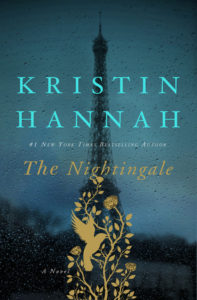For me, 2016 has been a year of historical fiction, diving into the depths of true events told through the lives of made-up characters and their imaginary relationships. To me, historical fiction brings to life the events in a way that is more relatable than reading about it in terms of dates and numbers. This all remains true for the novel The Nightingale, by Kristin Hannah, which tells the story of two sisters coming of age in France during WWII as it is remembered by one of the girls decades after the war. Both girls take a different approach in how they react to the onset and fallout of war, Isabelle jumping in (as some say quite recklessly) risking her life to take an active role in resisting the occupation and Vianne, more inwardly, fighting personal battles to protect her family, home, and reputation in order to survive. The relationship between the two sisters ebbs and flows throughout the story as they adapt and change to the situation at hand.
The juxtaposition of the two main characters and how they reacted and received each other’s actions in a time of upheaval made me think of the ways in which girls react to injustices of today. There is a version of self that you want to be and then there is the true version of self that you become when put in a difficult situation. Or as Hannah puts it in the book, “In love we find out who we want to be; in war we find out who we are.”
For me, I found myself cheering on the side of Isabelle who looks death, violence, and war in the face and found a way to play a vital role in saving lives and resisting the evildoers. She was strong and ignored arguments against her actions to stay true to her beliefs. This is who I want to be. But in the face of injustice, I know this is not who I always am. Erring more on the side of Vianne, I am more likely to fight passively, doing what is right in my own eyes but safely without the eyes of others on me. Both Isabelle and Vianne take risks, and follow their morals, but do so in different ways. The Nightingale tells us that both ways are acceptable and having that option makes me feel more secure in my personal decisions despite how others might react.
Sidenote: Shout out to a real girl and true hero!
The character of Isabelle was based off of a¬†real girl, Andr√©e de Jongh, who set up a network (called the Comet Line) to help escaped Allied soldiers get from Belgium to the safety of Gibraltar. She took major risks and made many trips across dangerous terrain to save the lives of soldiers. If you‚Äôre interested in reading more, join me in reading¬†The Freedom Line; the Brave Men and Women who Rescued Allied Airmen from Nazis during World War II. It’s¬†next on my list!
-Chelsea Collison
Junior Girl
Girl Museum Inc.

